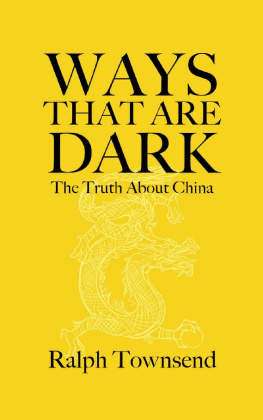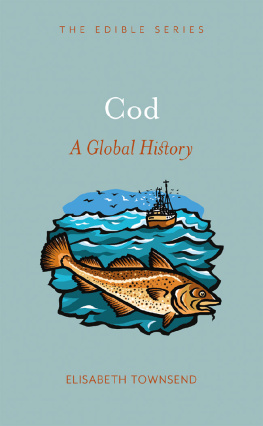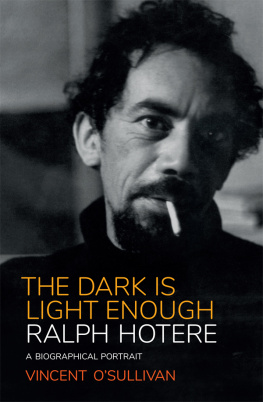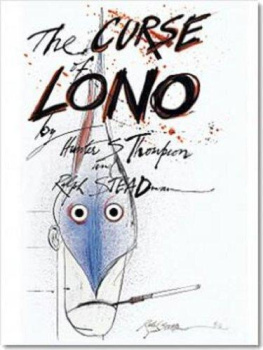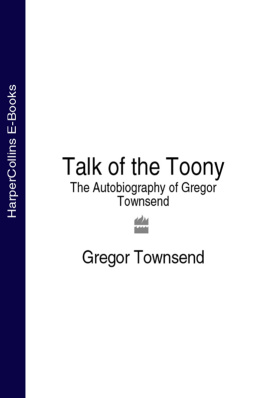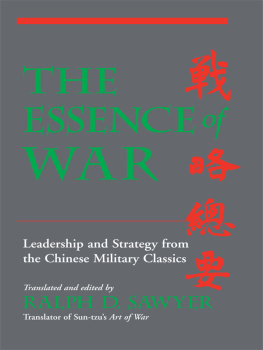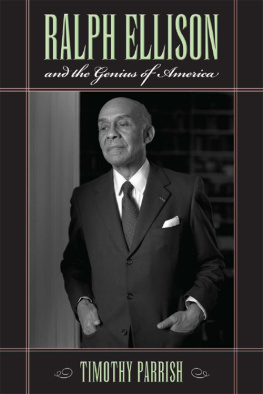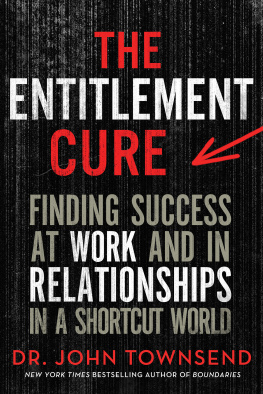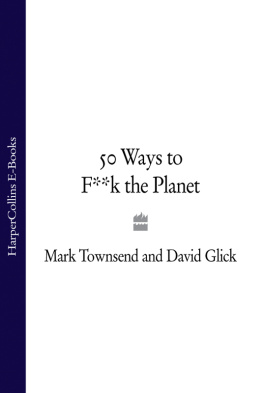Ralph Townsend - Ways that are Dark: The Truth about China
Here you can read online Ralph Townsend - Ways that are Dark: The Truth about China full text of the book (entire story) in english for free. Download pdf and epub, get meaning, cover and reviews about this ebook. year: 1933, publisher: Barnes Review, genre: Art. Description of the work, (preface) as well as reviews are available. Best literature library LitArk.com created for fans of good reading and offers a wide selection of genres:
Romance novel
Science fiction
Adventure
Detective
Science
History
Home and family
Prose
Art
Politics
Computer
Non-fiction
Religion
Business
Children
Humor
Choose a favorite category and find really read worthwhile books. Enjoy immersion in the world of imagination, feel the emotions of the characters or learn something new for yourself, make an fascinating discovery.
- Book:Ways that are Dark: The Truth about China
- Author:
- Publisher:Barnes Review
- Genre:
- Year:1933
- Rating:3 / 5
- Favourites:Add to favourites
- Your mark:
- 60
- 1
- 2
- 3
- 4
- 5
Ways that are Dark: The Truth about China: summary, description and annotation
We offer to read an annotation, description, summary or preface (depends on what the author of the book "Ways that are Dark: The Truth about China" wrote himself). If you haven't found the necessary information about the book — write in the comments, we will try to find it.
Ways that are Dark: The Truth about China — read online for free the complete book (whole text) full work
Below is the text of the book, divided by pages. System saving the place of the last page read, allows you to conveniently read the book "Ways that are Dark: The Truth about China" online for free, without having to search again every time where you left off. Put a bookmark, and you can go to the page where you finished reading at any time.
Font size:
Interval:
Bookmark:
WAYS THAT ARE DARK
The Truth About China
first published in 1933
Which I wish to remark,
And my language is plain
That for ways that are dark
And tricks that are vain,
The heathen Chinee is peculiar,
Which the same I would rise to explain.
Bret Harte
This book on China and the Chinese will contain no apologies. It will present no strenuous effort, where uncomplimentary revelations are made, to drag in some supposedly extenuating or counterbalancing virtue possessed by the people whose actions and attitudes are under review in the pages to follow. We have had enough of all that. Too many otherwise worth-while books dealing with China have muddled their information and left their readers confused by fatuous attempts to sprinkle bright hopes over dark facts.
And there has been of late a superabundance of maudlin sentiment about China in comparison with the scarcity of clear-cut information. This book is intended to supply information. If reading it requires at times a strong stomach, this book at least is an honest attempt to present the facts as they are, however unpleasant. An accurate survey of what is now going on in China necessarily includes much that is hideous and terrible, for the simple reason that a great deal of what the Chinese are doing is hideous and terrible. An understanding of recent developments there is impossible without an intimate appreciation of the staggering misery gripping the majority of the population a fifth of the earths people struggling helplessly and meaninglessly against fate and themselves. The many aspects, political, social and economic, of the tragedy are but so many varied hues in a single spectroscope of distress, its focus upon a scene of misery vast beyond the dimensions of human pity.
Yet the very vastness of the spectacle places some obligation upon us rationally and emotionally to understand its intricacies, to understand the many conflicting frenzies of attempted survival there which paradoxically produce in the total a strange inertia. China for fifty centuries has moved glacier-like, ponderously and slowly, without serious deflection at any time, ever gathering its weight of population, ever settling towards its obscure destiny, its masses ever increasingly crushed by their own pressure upon themselves. That destiny, as manifest in the lot of the average Chinese there, more and more ominous and intolerable with the accumulated centuries, unfailingly appalls the thinking Westerner who gazes upon it. Though the average American can look at the China scene with detachment and aloof from its colossal tragedy, there are ways, vivid and real, in which it menaces our own future, and to avoid these dangers it is important to understand its peculiar features.
This last consideration calls for a new note of realism in our survey of China. For our own welfare and the best permanent interests of all concerned, the situation calls for a sterner realism than that to which we have been accustomed, in order to view and to accept the facts as they are. The facts are repellent. But they exist, and we dwell in the same small world with them. Nothing useful can be accomplished by attempting to cover them up.
Despite the amount that has been recently written and spoken on the subject, China remains incomprehensible for most American readers. In appraising a stranger with whom we are to deal, it is important to know his shortcomings. On any other basis of approach, whatever our spiritual generosity in rating at full measure his virtues, we are likely to lose heavily. His good points, if any, will take care of themselves. They are sure to crop up in time, and regardless of when and how convincingly they come to light, we face no liabilities, losses or disappointments through them.
With the strangers unfavorable points it is different. These are the ones that menace us, and they are therefore the ones to be taken into account early and faced realistically. There is no common sense reason why the United States should repeat in the Far East its stupendous blunders made in Europe during and just after the World War. We are still paying a severe penalty for failure to appraise at that time the character of some of the nations with which we were thrown suddenly into complex relations. In the case of France, for example, a better estimate of French character, with due heed paid to that estimate, would have dictated a more cautious and conservative policy on our part. We should be liked more in France today as a result, and on this side we should have less cause to feel resentment.
The difficulty in the case of China is that very little reliable information has been available to guide us. And what little there is but a microscopic trifle amid mountains of misinformation, so that only a person fairly conversant with the field can distinguish truth from fantasy.
If the origins of most books and articles on Far East affairs could be known, it would be found that an astonishing number spring from sources too closely associated with particular interests to be trusted. This does not mean that all the authors are propagandists or hypocrites. It means that most of them are out to prove a point, to show that religion or this or that course of action will be the salvation of the masses there, and the evidence in support of such a contention is marshaled accordingly. In reading the current crop of books on China, intelligent foreign residents on the scene see in a few of them outright misstatements of fact. But this is not usual. The commoner error is the omission of much that is highly significant.
Facts about China have been scarce for a very simple but excellent reason. There are just three classes of foreigners living there who know conditions. Each of these is handicapped; in any effort to tell the truth. The three main classes of foreigners on the spot are: (1) the Missionaries, (2) the Business Men, and (3) Government Officers, mainly men in the Consular and Diplomatic Service. The missionaries do not care to tell the truth, because if the truth were known continued support for their projects would be jeopardized. The business men are not disposed to tell it, for the reason that their goods might meet a boycott by offended Chinese, or their firms suffer some other penalty. American Government Officers, while they remain in the employ of the Government, are strictly forbidden to say anything publicly except something flattering about the country in which they are stationed. Hence members of the best-informed foreign groups on the scene are circumstantially gagged, as far as telling the whole truth is concerned.
It is this injunction of secrecy upon affairs in China, imposed upon the vast majority of the foreigners there, that has resulted in a complete misapprehension of the facts back in America. If a returned Government employee, still in Government service, is asked to speak in this country, for example, he must submit to Washington a copy or a synopsis of his speech. If he tells the whole truth he faces a good deal of trouble, if not outright dismissal. So instead of giving his audience a balanced presentation of significant facts, he tries to put on a show of optimism and expand as much as possible upon what may be considered the brighter side. This half-truth activity, frequent and widespread, does more harm than good. The audience, crediting the speakers excellent opportunities for observation, goes away thinking it has a reliable summary of the China situation. The returned business man is in very much the same predicament in the matter of telling the truth. He is anxious to avoid newspaper publicity as an adverse critic of China for the reasons mentioned.
The missionary is under less restraint. The Government man or the business man may yearn in his soul to speak his mind. But no such agitation to reveal actualities besets the missionary. To tell all the facts would be the last thing he would care to do. But to tell the facts or alleged facts favorable to him is a task he undertakes with enthusiasm. The missionarys emotional zeal for his cause gives him fluency in dispensing glowing assurances of progress, little evidence of which is visible on the scene. More twaddle has come out of China from the missionaries than from any other source. It is not that they set out to make definitely false statements. The overwhelming majority have lofty aims and high personal standards precluding the suspicion of intentional falsehood. But they display such a proneness to exaggerate what they consider hopeful signs, and such a positiveness in stating as fact what is nothing more than their own hope, together with almost invariably omitting information unfavorable to their cause, that they are as a class wholly untrustworthy for reliable data. Conceding that they are sincere, there is something in the mental machinery of the religious zealot that tends to make him incapable of cool, analytical observation and accurate, balanced presentation of facts. The individual exceptions among the class are comparatively few.
Font size:
Interval:
Bookmark:
Similar books «Ways that are Dark: The Truth about China»
Look at similar books to Ways that are Dark: The Truth about China. We have selected literature similar in name and meaning in the hope of providing readers with more options to find new, interesting, not yet read works.
Discussion, reviews of the book Ways that are Dark: The Truth about China and just readers' own opinions. Leave your comments, write what you think about the work, its meaning or the main characters. Specify what exactly you liked and what you didn't like, and why you think so.

